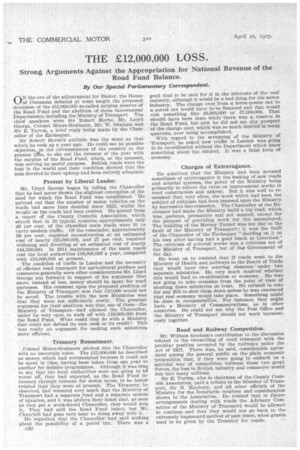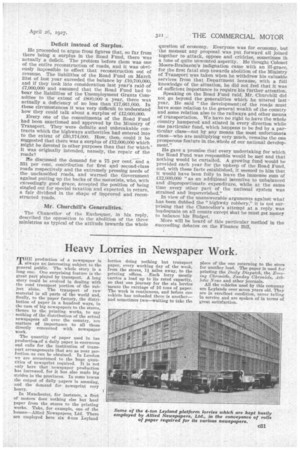THE 212,000.000 LOSS.
Page 52

Page 53

If you've noticed an error in this article please click here to report it so we can fix it.
Strong Arguments Against the Appropriation for National Revenue of the Road Fund Balance.
By Our Special Parliamentary Correspondent.
ON the eve of the adjournment for Easter, the House of Commons debated at some length the proposed diversion of the £12,000,000 so-called surplus reserve of the Road Fund and the abolition of three Government Departments, including the Ministry of Transport The chief speakers were Sir ' Robert Horne. Mr. Lloyd George, Colonel Moore-Brabazon, Mr. W. Graham and Sir E. Turton, a brief reply being made by the Chancellor of the Exchequer.
Sir-Robert Home's attitude was the same as that which he took up a year ago. He could see no possible objection, in the circumstances of the country at the present tie, to eke out the revenue or the year with the surplus of the Road Fund, which, at the moment, was serving no useful purpose. British roads were the best in the world and their condition showed that the sum devoted to their upkeep had been entirely adequate.
Protest by Liberal Leader.
Mr. Lloyd George began by telling the Chancellor that he had never shown the slightest conception of the need for which the Road Fund was established. He pointed out that the number of motor vehicles on the roads had more than doubled since 1921, whilst the w-.2ight on the roads had been trebled. He quoted from a report of the County Councils Association, which stated that in 16 typical counties approximately only 48 per cent, of the classified main roads were fit to Carry modern traffic. Of the remainder, approximately 38 per cent, required reconstruction at an estimated cost of nearly £25,000,000, and 27 per, cent, required widening and diverting at an estimated cost of nearly £44,500,000. In 1911 maintenance of the main roads cost the local authorities £18,000,000 a year, compared with £54,000,000 at present.
The condition of traffic in London and the necessity of efficient road transport for agricultural produce and commerce generally were other considerations Mr. Lloyd George put forward in support of his argument that more, instead of less, money should he spent for road purposes. His comment upon the proposed abolition of the Ministry of Transport was that £10,000 would not be saved. The trouble with the new Ministries was that they were not sufficiently costly. The greatest argument for their abolition was that one of them--the Ministry of Transport—had allowed the Chancellor, under its very eyes, to walk off with £19,000,000 from the Road Fund. What could they do with a Ministry that could not defend its own cash or its credit? This was really an argument for making such ministries more efficient.
Treasury Resentment.
Colonel Moore-Brabazon pitched into the Chancellor with no uncertain voice. The £12,000,000 he described as money which had accumulated because it could not be spent in time, having been taken from one year to another for definite programmes. Although it was truq to say that the local authorities were not going to bd worse off, they had expected, as the Road Fund increased through revenue for motor faxes, to be better treated than they were at present. The Treasury.; he observed, had resented very much that the Ministry of Transport had a separate,fund and a separate system of taxation, and it was always their boast that, as soon as they got a weak-kneed Chancellor, they would stop it. They had still the Road Fund intact, but Mr. Churchill had gone very near to doing away with it.
He regretted that the Chancellor' had said nothing about the possibility of a petrol tax. There was a c30
good deal to be said for it in the interests of the coal industry, although it would be a bad thing for the motor industry: The change over.' from a horse-power tax to a petrol tax would have tohe financed and that would cost something Ike £6,000,000 or £7,000,000. That should -have been done while 'there wasa reserve in the Road Fund, 'but now he did not see any prospect of the change over, which was so much desired in many quarters, ever being accomplished.
With regard to the scrapping of the Ministry of Transport, he asked how traffic in London was going to be co-ordinated without the Department which knew something about the subject. It was a false form of economy.
Charges of Extravagance.
He admitted that the Ministry had been accused sometimes of extravagance in the making of new roads and arterial systems, the policy of the Ministry being primarily to relieve the rates on improvement works in road construction and upkeep. But it was well to remember that, very often, the work which had been the subject of criticism had been imposed upon the Ministry by successive Governments. The Chancellor of the Exchequer had made the Ministry build a big road, which was, perhaps, premature and not wanted, except for the purpose of providing work for the unemployed. The building of the Mersey Tunnel was not due to the fault of the Ministry of Transport-, it was the fault of the Chancellor of the Exchequer "deciding on it on his own after having had a good lunch at Liverpool." The criticism of arterial works was a criticism not of the Ministry of Transport, but of the Government of the day.
He went on to contend. that if roads went to the Ministry of Health and railways to the Board of Trade they would have two warring elements under two separate ministries. He very much doubted whether this would lead to co-ordination or economy. He was not going to take economy. from the point of view of shutting down ministries on trust. He refused to vote for any Bill to shut them down unless he was convinced that real economy would take place. Something might be done in reorganizalion. For instance, they might have a Ministry of Communications, as in other countries. He could not see why the Post Office and the Ministry of Transport should not work harmoniously together.
Road and Railway Competition.
Mr. William Graham's contribution to the discussion related to the reconciling of road transport with the peculiar position occupied by the railways under the Act of 1921. There was, he said, considerable agreernent among the general public on the plain economic proposition that, if they were going to embark on a suicidal war of competition between those two great forces, the loss to British industry and commerce would rim into many millions.
Sir E: Turton, who-is chairman of the County Councils Association, paid a tribute to the Minister of Transport, Sir H. •Maybury, and all other officials of the Ministry for the invariable courtesy and consideration shown to the Association. He trusted that in future arrangements dealing with roads the Advisory Committee of the Ministry of Transport would be allowed to continue and that they would not go back to the extremely haphazard method of past times, when grants used to be given by the Treasury' for roads.
Deficit instead of Surplus.
He proceeded to argue from figures that, so far from there being a surplus in the Road Fund, there was actually a deficit. The problem before them was one of the entire reconstruction of roads, and it was obviously impossible to effect that reconstruction out of revenue. The liabilities of the Road Fund on March 31st of last year exceeded the balance by 110,700,000, and if they took into consideration last year's raid of £7,000,000 and assumed that the Road Fund had to hear the liabilities of the Unemployment Grants Committee to the extent of £800,000 a year, there was actually a deficiency of no less than '£17,661,000. In these circumstances it was very difficult to understand how they could talk about a surplus of £12,000,000.
Every one of the commitments of the Road Fund had been sanctioned and approved by the Ministry of Transport. They were definite and unbreakable contracts which the highways authorities had entered into to the extent of £30,174,000. How, then, could it be suggested that there was a surplus of £12,000,000 which might be devoted to other purposes than that for which' it was originally intended, namely, the repair of the roads?
rte discussed the demand for a 75 per cent. and a 33i per cent, contribution for first and second-class roads respectively and the extremely pressing needs of the unclassified roads, and warned the Government against putting up the backs of the motorists, who, with exceedingly good grace, accepted the position of being singled out for special taxation and expected, in return, a fair dividend in the shape of improved and reconstructed roads.
Mr. Churchill's Generalities.
The Chancellor of the Exchequer, in his reply, described the opposition to the abolition of the three ministries as typical of the attitude towards the whole question of economy. Everyone was for economy, but the moment any proposal was put forward all joined together to attack, oppose and criticise, sometimes in a tone of quite unwonted asperity. He thought Colonel Moore-Brabazon's indignation came with an ill-grace, for the first fatal step towards abolition of the Ministry of Transport was taken when he withdrew his valuable services from that Department because, with a full knowledge of the situation, he did not feel that it was of sufficient importance to require his further attention.
Speaking on the Road Fund raid, Mr. Churchill did not go beyond the generalities which he uttered last year. He said 'the development cof the roads must have some relation to the general wealth of the country and some relation also to the railways and other means of transportation. We have no right to have the whole country hampered and stinted in every direction while one particular fund, which happens to be fed by a particular class—not by any means the most unfortunate class—who are multiplying very much, remains the one prosperous feature in the ,*hole of our national development."
He gave a promise that every undertaking for which the Road Fund was responsible would be met and that nothing would be curtailed. A growing fund would be provided each year for the upkeep of the Road Fund, and, with these facts established, it seemed to him that it would have been folly to leave the immense sum of £12,000,000 "as an additional incentive to unbalanced and disproportionate expenditure, while at the same time every other part of the national system was strained and impoverished."
In view of the unanswerable arguments against what has been dubbed the " highwily robbery," it is not surprising that the Chancellor's attempt at a reply was inadequate on all counts except *hat be must get money to balance his Budget.
More will be heard of this particular method in the succeeding debates on the Finance Bill.












































































































